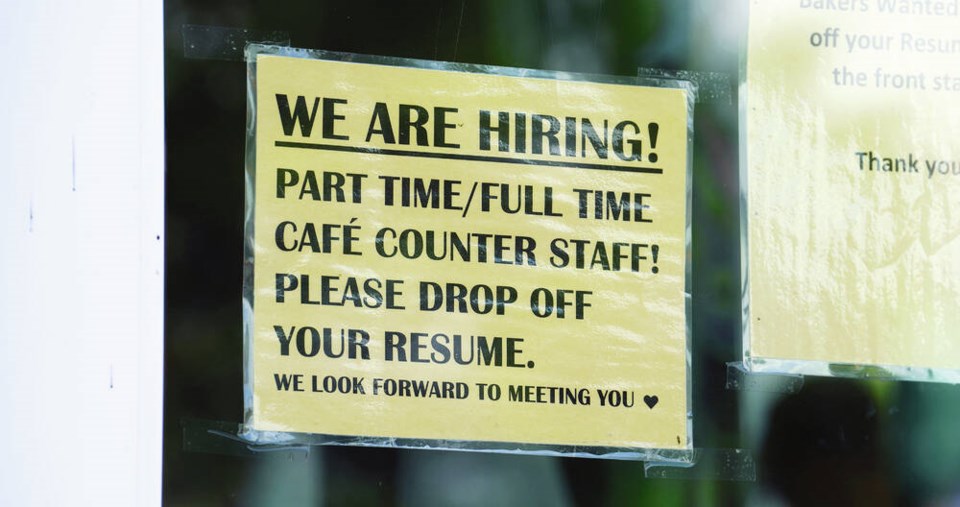Incoming restrictions for Canada’s temporary foreign worker program are bringing uncertainty for some Island employers who say there aren’t enough local workers applying for their jobs.
On Monday, the government announced that employers will only be allowed to hire a maximum of 10 per cent of their workforce through the temporary foreign worker program, down from the previous 20 per cent starting Sept. 26.
The maximum time that a worker hired through the program’s low-wage stream — defined as workers being paid below the median income of a province — is being halved to one year.
B.C. Restaurant and Food Services Association president and CEO Ian Tostenson said the restaurant industry will be pushing for a sector-wide exemption for chefs and cooks hired through the temporary foreign worker program.
“We’ve heard from about a dozen restaurants and every one of them are really concerned about the potential changes.”
A number of sectors, including agriculture, construction and health care, are being granted exceptions in hiring limits.
Restaurateurs are always looking to hire local and often have no problem finding hosts and bussers, he said.
“It’s the skilled worker that we’re worried about,” he said. “There’s just not a lot of people that are wanting to be cooks and chefs in Canada.”
Over the past five years, hundreds of restaurants across Vancouver Island have used the association’s temporary foreign worker hiring services to employ workers from abroad, he said.
Tostenson estimates there’s a one in five chance that a Victoria-area restaurant has employees through the temporary foreign worker program.
The labour shortage is being partly caused by the fact that more people are retiring from the workforce than entering it, he said. “For every three people that retire in British Columbia, we’re only replacing two. We are a third short in our workforce.”
Wickaninnish Inn managing director and president Charles McDiarmid said that just under 20 per cent of the Tofino resort’s 180 employees are employed through the temporary foreign worker program.
McDiarmid said while he would love to hire as locally as possible, staffing has been a persistent issue at the inn since it opened in 1996.
Canadians aren’t always willing to relocate to a rural location, he said, noting that the resort had at least 10 unfilled positions this summer. “And you just don’t find a pastry chef around the corner in a small town.”
And the housing shortage isn’t helping, he said. “It used to be that three or four employees could get together and rent a house. Well, those now are vacation rentals.”
Wickaninnish Inn has bought and built a total of eight homes in the past three years to try to entice workers, he said.
“It doesn’t matter if they come from Timbuktu or Newfoundland or Victoria,” he said. “We have to provide beds for everyone, otherwise we can’t hire them.”
The company spends more than $1,000 in advertising and application costs for every temporary foreign worker they employ, who earn the same wages as other workers, he said. “It’s much easier for us if we could just hire anyone from Canada.”
During the Monday announcement, Prime Minister Justin Trudeau told reporters in Halifax that Canadian businesses need to invest in training and technology and not just rely on low-cost foreign labour. “It’s not fair to Canadians struggling to find a good job and it’s not fair to those temporary foreign workers, some of whom are being mistreated and exploited.”
University of Victoria sociology assistant professor Anelyse Weiler said some people, politicians included, are increasingly blaming migrants for affordability concerns in Canada.
“I think there was a lot of pressure on the federal government to do something,” she said.
But the changes to the program won’t address those concerns, said Weiler, a researcher on migrant worker issues.
“A lack of affordable housing, inadequate wages, those aren’t being generated by migrants. Those are choices that employers make and choices that governments make.”
The temporary foreign worker program was introduced in the 1970s as a stopgap measure for labour shortages at the time, Weiler said.
But since then many employers have become dependent on the program in a rather permanent way, she said.
“It, in effect, has made labour shortages self-fulfilling because employers no longer face pressure to advertise competitive wages and working conditions that would attract people who have better options.”
Of the 1,225 employer applications for temporary foreign worker jobs approved on Vancouver Island by the Canadian government from January to March, 858 were for a job that paid below the median hourly wage of B.C. workers, which was $27.50 during early 2024.
The most common employer application was for a cook position at 223 jobs, followed by kitchen support staff at 165 and “food service supervisors” at 153, according to data released by the federal government.
>>> To comment on this article, write a letter to the editor: [email protected]




